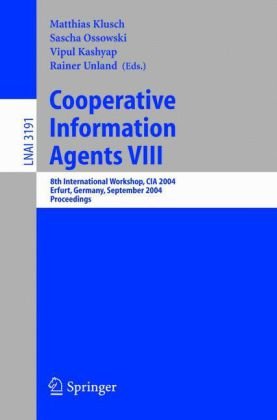

Most ebook files are in PDF format, so you can easily read them using various software such as Foxit Reader or directly on the Google Chrome browser.
Some ebook files are released by publishers in other formats such as .awz, .mobi, .epub, .fb2, etc. You may need to install specific software to read these formats on mobile/PC, such as Calibre.
Please read the tutorial at this link: https://ebookbell.com/faq
We offer FREE conversion to the popular formats you request; however, this may take some time. Therefore, right after payment, please email us, and we will try to provide the service as quickly as possible.
For some exceptional file formats or broken links (if any), please refrain from opening any disputes. Instead, email us first, and we will try to assist within a maximum of 6 hours.
EbookBell Team

4.4
62 reviewsThese are the proceedings of the 8th International Workshop on Cooperative Information Agents (CIA 2004), held at the Fair and Congress Center in - furt, Germany, September 27–29, 2004. It was part of the multi-conference Net. ObjectDays 2004, and, in particular, was co-located with the 2nd German Conference on Multiagent Systems Technologies (MATES 2004). In today’s networked world of linked heterogeneous, pervasive computer systems, devices, and information landscapes, the intelligent coordination and provision of relevant added-value information at any time, anywhere, by means of cooperative information agents becomes increasingly important for a variety of applications. An information agent is a computational software entity that has access to one or multiple, heterogeneous, and geographically dispersed data and information sources. It proactively searches for and maintains information on behalf of its human users, or other agents, preferably just in time. In other words,itismanagingandovercomingthedi?cultiesassociatedwithinformation overload in open, pervasive information and service landscapes. Cooperative - formation agents may collaborate with each other to accomplish both individual and shared joint goals depending on the actual preferences of their users, b- getary constraints, and resources available. One major challenge of developing agent-based intelligent information systems in open environments is to balance the autonomy of networked data, information, and knowledge sources with the potential payo? of leveraging them using information agents. Interdisciplinaryresearchanddevelopmentofinformationagentsrequires- pertise in relevant domains of information retrieval, arti?cial intelligence, database systems, human-computer interaction, and Internet and Web techn- ogy.